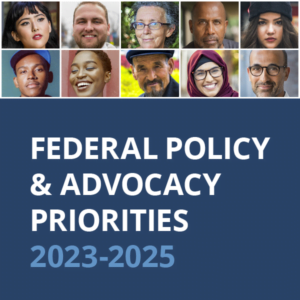Federal Policy & Advocacy Priorities 2023-2025
Expand Addiction Recovery:
Increase accessibility of recovery supports and services.
- Diverse Funding & Sustainability
Diversify funding streams for recovery support services across federal and state agencies, including a dedicated 10% Recovery Set-Aside within the Substance Use Prevention, Treatment, and Recovery Services Block Grant.
- Measurement Outcomes
Establish a standardized set of recovery measurement outcomes with federal and state agencies and partners, to guide government agencies and providers.
- Inclusive Care & Services
Increase funding for research initiatives that promote recovery support practices in specific populations, including Black, Indigenous, and People of Color, as well as the adolescent community, and impacted families with children.
- Black, Indigenous, and People of Color Equity
Enact federal and state funding for recovery support service providers led by or serving Black, Indigenous, and People of Color.
- Harm Reduction
Ensure laws and regulations reflect harm reduction principles, especially within recovery spaces, including permitting medications for addiction treatment in recovery residences.
Nurture Social Determinants of Recovery:
Remove barriers and affirm low-barrier initiatives for housing, health, education, employment, and social support.
- Fair Housing & Transportation Security
Expand access to safe housing and transportation assistance for addiction recovery, including patient protection from discharge from programs and services without additional connections to appropriate levels of care.
- Educational Opportunities
Increase access to vocational training, recovery schools, and higher education programs, and eliminate conviction barriers to student aid and grant programs.
- Employment & Workforce
Expand Recovery-Ready Workplace (RRW) models and strengthen the peer recovery support workforce, including eliminating arbitrary penalties for past criminal convictions.
- Social Support & Access to Basic Needs
Expand related and easy-to-navigate services, and bolster the role of the peer recovery workforce and harm reduction practices within systems.
- Deflection & Reentry
Expand programming to support diversion and deflection, avenues for expungement of low-level drug offenses, and increase reentry support for incarcerated people.
Protect and Restore Civic Engagement & Liberties:
Harness passion and action for grassroots engagement.
- Voting Rights
Protect the right to vote for people who use drugs, and reverse felony voting bans in states.
- Patient Privacy Rights
Protect patient privacy rights for people who use drugs as well as people and families seeking addiction treatment and recovery supports, including strengthening patient health information safeguards that prevent unauthorized disclosure.
- Input & Feedback
Ensure people with lived experience, including people who use drugs, participate in research and policymaking, and have a voice in regulations and legislation that directly impacts them, including establishing best practices for research relating to people with addiction.
- Representation & Feedback
Increase the prevalence of people in addiction recovery in government and policymaking roles through fellowships and internships.

